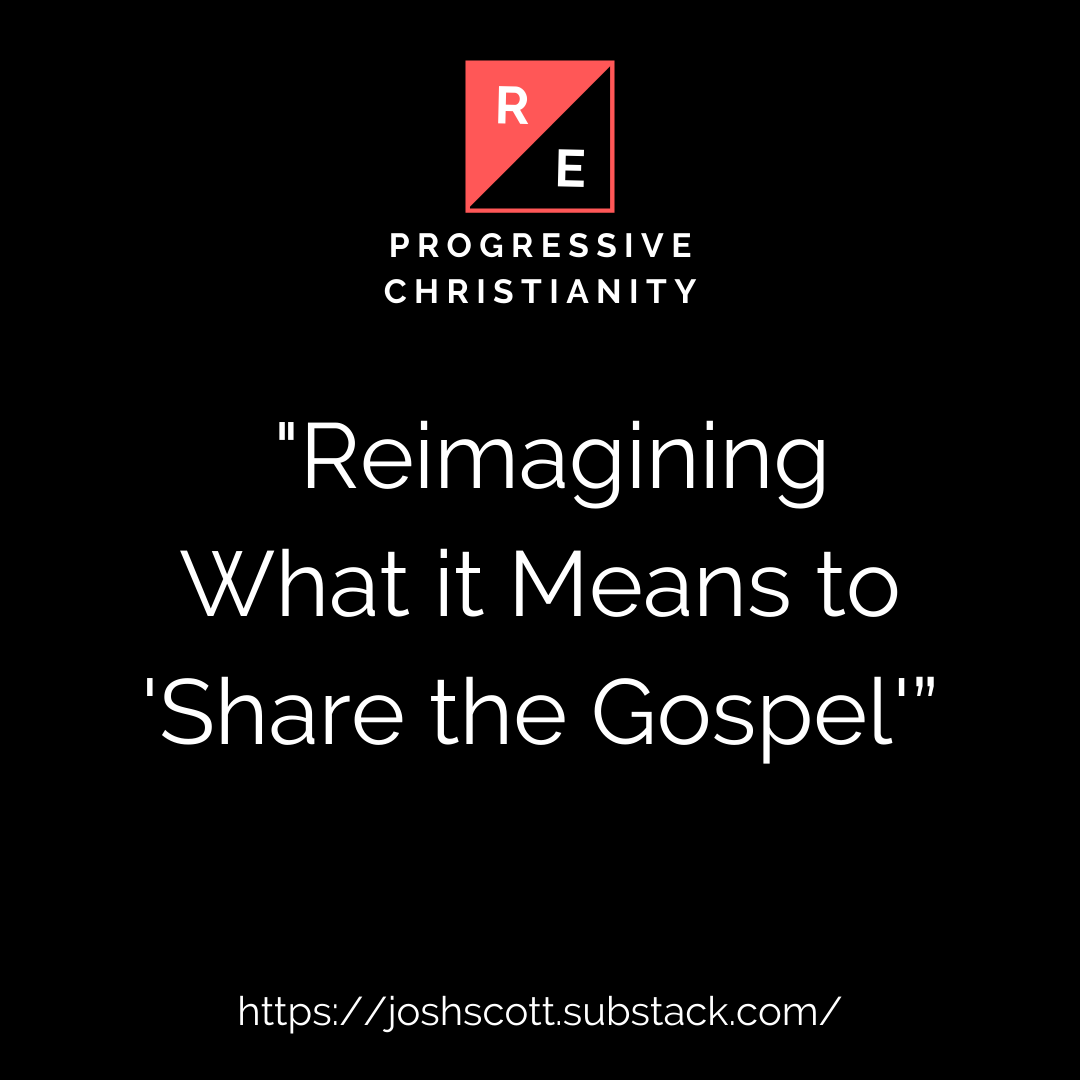Reimagining What it Means to “Share the Gospel”
What is the Gospel and What Does it Mean to “Evangelize” from a Progressive Christian Lens?
A large part of my conservative Christian upbringing was focused on “sharing the Gospel,” otherwise known as evangelism. The need to do this was imperative; billions of people will die without professing faith (and a specific kind of faith, depending on who’s talking about it) in Jesus as their savior, and as a result they will spend endless eternity being tormented in hell (or so we genuinely believed). Our plan to make sure every human came to the faith we were convinced they needed was to go into the church basement and make witnessing bracelets (see exhibit A).
Each bead color had a meaning: black represented our sin, red the blood of Jesus, white the newfound purity we gain from said blood, blue baptism, green new life, and yellow represented the streets of gold in heaven, which could be yours if you accept the message of all the previous beads.
The next step was to load up the entire youth group into a couple of church vans and release us at the mall to evangelize complete strangers. That last part was hard for me. I was a shy kid, and didn’t really want to burst into the life of a complete stranger by asking them personal questions.
As my faith has shifted over the last fifteen years or so I have wrestled with what role, if any, evangelism might play in my life as a Progressive Christian. I no longer believe that people who don’t profess some sort of belief in Jesus will be tortured for eternity. I’m not an exclusivist, and I trust that people encounter God through all sorts of religious paths, and non-religious ones as well. What I’ve discovered is that, for me, sharing the gospel or not sharing the gospel ultimately depends on what we mean by that word, gospel.
If by gospel we mean a series of propositional beliefs we must hold and profess in order to obtain forgiveness, salvation, and relationship with God, then I’ll pass on sharing it.
If by sharing the gospel we mean introducing people to a dehumanizing, fear inducing, and shame based system that focuses on evacuation from this world to a disembodied reality, while ignoring the real problems and injustices we face on the earth, then we should stop talking about it altogether.
However, an exploration of what the word gospel actually means, and from where it comes, might offer us a way to reframe and reclaim it’s meaning for our ever evolving faith.
To begin with, gospel isn’t a religious term, but a political one. In the first centuries BCE and CE the word gospel referred to an announcement, specially one about Caesar Augustus and the Pax Romana, or “Roman Peace,” an era of prosperity and peace that his reign brought about in Rome (through brutal violence, as is the way of empire). After Julius Caesar died, Rome entered into a civil war that threatened to tear the republic apart. When the dust settled Caesar’s adopted nephew and heir, Octavian (soon-to-be Augustus), had won the war and restored stability and peace. The announcement of this victory and subsequent peace was called gospel, literally “good news.”
Jesus would have been aware of this meaning. He was born during the reign of Augustus, and his public activity took place during Tiberius, the second Roman emperor. Everything Jesus says and does happens under the watchful eye of the Roman authorities. So, when Jesus announces his understanding of gospel, it isn’t a religious message about accepting some statements about him to be true, but a subversive alternative to the message of the empire. Jesus’s gospel is a vision for how the world could, and should, be.
Jesus’s understanding of the good news was that it centered on the accessibility of the kingdom here and now (Mark 1) and that it involved a transformation of the social order (Matthew 5, Luke 4). This vision, a gospel that is actually good news, of justice and jubilee, is transformative.
So, what does it mean to ‘evangelize’ from this lens?
By sharing the gospel we mean announcing the belovedness and inclusion of every human being in the love and embrace of God, no exceptions.
By sharing the gospel we mean engaging the practical work of announcing good news to the poor, proclaiming release to the prisoners and recovery of sight to the blind, and liberation for the oppressed, through concrete action in the world.
This evangelism, however, won’t be an invitation to believe some propositional truths or accept some points of doctrine. It will involve verbs, the doing of gospel work in the world. It also won’t be about producing converts to a religious system, but about the cultivation of human flourishing, whatever a person’s label might be.
The gospel according to Jesus is an announcement that if we choose to see and enter the kingdom, the kin-dom, of God, here and now, a world of justice and enough-ness for everyone isn’t just possible, it’s closer than we’d dare dream.
May it be so!




Hey Josh, I only discovered this site today, and I love what I read so far. Can you help me understand a little better about the issue of salvation, as to what it is?
Hey Josh - sharing this post with the ChildFund team today out on the Lauren Daigle tour as a little "pre-show" inspiration to center ourselves with purpose. Thanks for your writings!